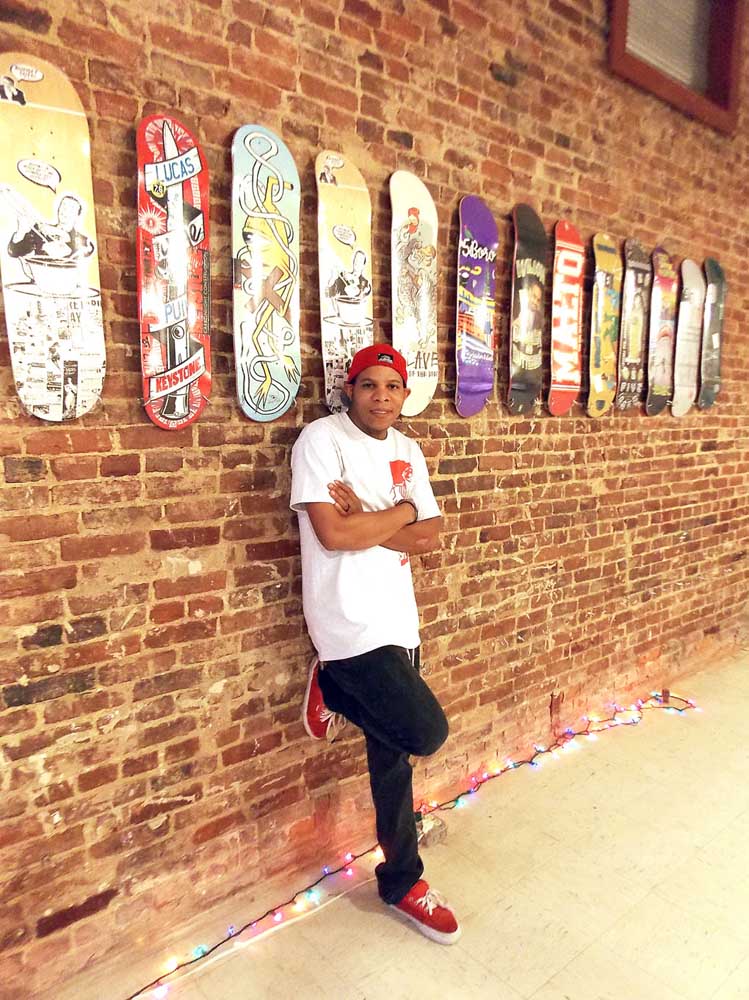Going somewhere
Published 6:04 am Monday, December 24, 2012

- Foster success 1 wr.jpg
Adrain Ware has loved skateboarding almost as long as he can remember.
Trending
Growing up in Dalton, the self-described “only black kid” around at the time, loved the past-time enough to spend hours with feet stuck to the wheels. It was transportation. It was fun. It was poetry.
Yet about the same time he remembers his love for skateboarding really blossoming — roughly when he entered his teen years — he also discovered new ways to get into trouble. He began drinking alcohol and using marijuana. Frequently, he hung with what he now calls the “wrong crowd.”
Ware landed in the Elbert Shaw Regional Youth Detention Center in Dalton more than once. With his father out of the picture until adulthood and a poor relationship with his mother, Ware said he and trouble often found each other.
Now in his 20s, Ware said his life is anything but what it used to be. For about a year, he’s been the proud owner of Poetic Skate Shop, a small business in Farmington, Mo., just a few miles from his home. He is a husband and the father of an 18-month-old child, and he said he uses his newfound success as a business owner to create a positive, drug-free environment for area enthusiasts while also encouraging them on a more personal level.
Ware credits a lot of what he learned in life to the roughly a year he spent in a boys group home with house parents Michael and Deborah Bessette. He said his relationship with the family, especially Deborah, continues.
He said it began when he was in detention, and she visited the center while the youth were participating in an art contest. Ware said Bessette liked his painting and began talking to him, eventually asking him if he would like to come live with her at Dalton Whitfield Boys Group Home. He agreed.
Trending
“At first, it took a lot of adjusting,” he said. “I felt like an outcast because there was all these different types of kids there. I felt like, ‘I don’t belong here,’ but then Ms. Deborah would just do nice little things for us.”
Through all of that, he said, he was able to absorb some lessons about right and wrong, and Ware said she loved all the boys “like we were her own kids.” Ware said she even went to the trouble to take care of some chronic medical issues he had, but he believes the treatment eventually became too expensive and he had to leave. He went back to his family, but his life for several years, he said, “was like a roller coaster.”
He didn’t want to leave the home, he said, but there was also a part of him that wanted his freedom again. The Bessettes kept him out of trouble, but when he left their care, trouble and Ware once again found each other. Drug use continued to be a part of his life, and he did not graduate from Dalton High School where he was enrolled.
Eventually, he moved to Atlanta where he used ecstasy and engaged in a road-to-nowhere lifestyle in which he and his buddies had trouble making ends meet because they spent so much on drugs and alcohol. Ware said he finally realized the futility of what he was doing.
“I was living a life that I knew I was better than that,” he said. “I knew it wasn’t for me. It was a life of drugs and partying. … I was like ‘Man, there has got to be something better than this.’”
He combed the newspaper classifieds for ideas and finally settled on getting his commercial drivers license (CDL). A company in Missouri offered a deal that he believed would allow him to be financially successful, so he left his old friends and lifestyle behind and headed north.
Ware said he initially failed the competency test required to work for the company, but on his last allowed attempt made the grade. He worked for the company a couple of years, he said, before he decided to seek greener pastures. Ware didn’t like the hazards of the road and driving in what he said were sometimes dangerous conditions, so he decided to pursue another dream — one that stemmed from his childhood days.
When he lived at the group home, every present the Bessettes gave him was skateboard-related. As a teen, he skateboarded in downtown Dalton. He skated to Walnut Square Mall and around Dalton State College. One time, he said, he skated almost all the way to Murray County. The times when his drug use and other troubles were at their worst always coincided with spending time away from skateboarding, he said.
Yet the past-time may also have contributed to him getting involved in drugs, he said. Not only was he the only black kid who skateboarded, he said, he was also the youngest in his group, and many of the older guys he looked up to were getting stoned and drunk.
Ware said he wants his shop to be not just a place to buy boards and gear, but also a place to go and enjoy what he calls the poetry of skateboarding without any of that other stuff in the way. Skateboarding is beautiful, like poetry, he said. It’s a means of expression.
He regularly hosts events with music or other activities, but he said he keeps a close eye out to ensure the drug culture doesn’t enter his store.
Deborah Bessette said she’s proud of Ware and all he’s accomplished. She doesn’t think of him as the kid who did drugs and got into trouble. She thinks of him as the kid who didn’t have the supervision and love he needed in his home life and got lost along the way.
“When Mike and I prayed about taking this position we said if one life can change then it’s worth it,” she said. “Let’s not go into this with rose-colored glasses thinking we’re going to change the world. If we with God’s strength can turn one child around (it’s worth it).”
Bessette said she and her husband have since changed jobs, but when they operated the group home, they had a saying in the house: “Catch them doing something good.” For the boys, ranging in age from 11 to 17, many of them just needed someone to show they loved them, she said.
Ware is now partnering with Youth for Christ, a Christian organization that offers support that helps him in his business. Ware said he works with the organization to offer weekly Bible study and pizza for area youth. He’s also working with community leaders to help organize a festival in Farmington involving music and river floats, and he hopes to continue to improve his business by adding an indoor skate park.
He also has definite ideas about how to treat kids who are “troubled.”
“Every kid has a different problem,” he said. “The best advice is no advice, kind of, because it’s better to listen to them sometimes than to preach to them. Sometimes when kids are going through, say drug problems, we say, ‘Hey, I’ve been there.’ I can tell them, ‘You think you’re at the end now. You’re not because once you’re down, you can only get up with no other place to go. Just consider that and keep in mind. Don’t always think that just because you’re in this rough position, you can’t ever go anywhere because you can.”
Ursula Davis, system of care director for the Georgia Division of Family and Children Services, said children who don’t grow up with their parents often have been exposed to things the “average child” in the community may not have faced.
“It’s always good to hear about a young person that is able to be successful (despite that),” she said.





